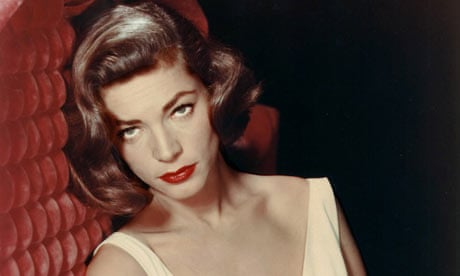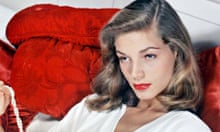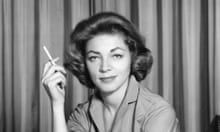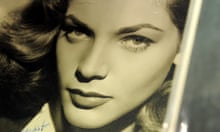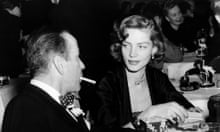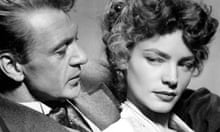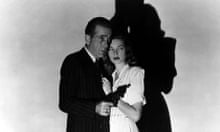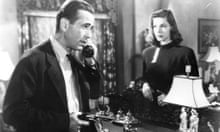At the Venice film festival last September, Lauren Bacall made what some might think of as a mistake. She was there with Nicole Kidman to promote their latest film, Birth - an intriguing thriller about a woman (Kidman) who comes to believe that a 10-year-old boy is the reincarnation of her dead husband. Bacall was playing Kidman's sceptical, wise-cracking mother. At one of the press conferences, a journalist asked her the formulaic question - how did she, a screen legend, feel about acting alongside Ms Kidman, another screen legend?
Now, Bacall knows, in her blood, how to deal with questions like these. Sixty years ago, the director Howard Hawks, who cast her, a 19-year-old ingenue, in her first film, To Have And Have Not, had shown her. You tilt your head at an angle, look up from under those direct eyes, and say ... as little as possible. It is all in the look, Hawks used to tell her. And even Bogie used to tell her, keep it quiet. If in doubt, don't answer.
But something got into her that day and she followed her instinct instead of her head. (Not for the first time, I can hear her saying in that dusky baritone.) "She's not a legend," she said of Kidman. "She's a beginner ... She can't be a legend, you have to be older." It was a comment immediately construed by the assembled media as competitive and insulting to Kidman - the film critic David Thomson described it as the product of "a soured ego". That wasn't how she had intended it, not at all, Bacall tells me. "What I meant was that her career is just beginning. She is wonderfully talented, a working actress. I hate these labels, I hate categories. Why do they have to burden her with all that?" Then she says this interesting thing. "Legends are all to do with the past and nothing to do with the present." Bogie is a legend, she says. "More of a legend now than ever. And he has been dead almost 50 years." The whole point about a legend is that it can't stand up to too much reality. If you want to be that old cliché "a legend in your own lifetime", like Garbo, you have to disappear.
Before meeting Bacall, I had heard a lot of things about her - almost all of them bad. That she is imperious, a grande dame, difficult, demanding, rude and bad-tempered. One particularly unkind story has it that while touring Woman Of The Year in 1981, a musical remake of the Hepburn/Tracy movie, the producers had to pay the cast and crew to stay behind for a birthday party they were giving her. But there were two, rather telling, dissensions. One, in an interview, from her son Sam: "I know where I am with my mother. I may not always like where I am, but I do know." The other from her friend Maggie Smith. "Betty [Bacall is called Betty by everyone close to her; it is her real name - Lauren was Hawks's idea] is one of the most courageous people I know. She has lived a long time on her own. I don't think she always likes it, but she never complains." It was Bacall, Smith says, who helped her come to terms with living alone after her husband died. "She has always said living alone is not as bad as living with someone you can't stand."
And, meeting Bacall, what you get is precisely this directness. She looks straight at you from still-dark grey eyes, ash-blond hair pulled back from a handsome face, now round. But the voice is still its husky self. "Listen, all of me is rounder now, since I gave up smoking 20 years ago," she says. And, no, thank you, she doesn't want a glass for her water. "This is how I like it" - pause - "straight out of the bottle."
She likes flirting, including with women, and she enjoys playing around with what she knows is her audience's image of her - the sassy kid. Jack Benny used to say she had the best comic timing in the business. She is elegant - slacks, striped shirt, red trainers - and though she wears a lot of gold on her hands, there are no gems. The look is no-nonsense, practical - about as different as can be from that feline down-under sultry look for which she is so famous.
And she has a vein of wry black humour. Though she likes living alone - "I would hate now to be married," she says, laughing - "it does occur to me on occasion that, if I fall and hit my head, there will be no one to make the phone call. But who wants to think about that disaster, I'd prefer not to."
Bacall has never been out of the public eye, or not for long. It's easy to lose count of the films she has made in her 60-year career - more than 50, as well as another 42 in which she appears as herself. Three new films are due out this year. Plus, there has been her acclaimed work in the theatre, winning her two Tony Awards. And she has just finished updating her autobiography, By Myself (when it was first published 27 years ago, it won her the National Book Award), adding almost 100 pages entitled And Then Some.
She has brought up three children, pretty much single-handedly - two, Stephen and Leslie, are Bogart's. Sam is her youngest from her second marriage, to Jason Robards. There were also three stepchildren from Robards's first marriage. "So, at times, we were quite a menagerie." Asked if she considers herself a good mother, she replies first, "I did the best I could." Then, "I wasn't the greatest daughter, either." Then she tells an anecdote: "I remember my oldest son, Steve, saying to me once, 'I don't ever remember seeing you with an apron on.' And I thought, that's right, honey, you did not. That was his concept of what a mother should be."
In the early 1940s, she recalls people saying to her, "You're a Jew? But you don't look like a Jew." "And I'd think, what's with this Jewish thing? Is it terrible to look it? Not to look it? Does it mean you have to look like Shylock?" What she hates above all, she says, is labels, stereotyping, prejudice. Bogie used to say to her, "There is only one prejudice you're allowed and that's against stupidity." "And you know that doesn't always make you popular," she says. Bogie got away with it, made a career out of it. And, as she recalls, her great friend Katie (Hepburn), got away with it, too. "She was much stronger, much more opinionated than I am or ever was, and it was considered attractive on her. But not on me. I don't know. Maybe her Bryn Mawr accent was more appealing than mine."
We like our legends dead, our elderly icons softly compliant. Bacall has never fitted this mould. There has always been something unsafe, unsure, unsettling about her, and she doesn't play Hollywood's nostalgia game - too crisp and casual and stylish for that. Also, by the time she came along, the mid-40s, Hollywood had abandoned its 30s pretence that the roaring 20s had never ended, that the golden pre-crash, pre-prohibition era would endure for ever, in favour of something more in keeping with America's dark, postwar mood. Film noir. All shadows and sombre angles.
Bacall's self-description, "I was this flat-chested, big-footed, lanky thing" - not beautiful in a rounded, voluptuous way - suggested a new kind of male fantasy figure: neither angel nor demon beauty. She is smart as well as vulnerable. From the moment we first see her in the doorway of Steve/Bogart's Martinique hotel room in To Have And Have Not (it was Hawks's brilliant notion to have her slouching against the doorpost), we realise, as Steve realises, that this is a woman who is all angles - angular beauty, sharp, angled suits; lippy, funny, sexy, provocative. We hear her, Steve hears her, before he/we see her. "Anybody got a match?" Bogart doesn't reply, goes to his desk and from a distance of 12ft or so tosses the matches to her. In reality, "I missed it many times ... trembling." In the film, seeming barely to move, she flicks up her hand like a paw to catch them mid-air. Equally memorable are her lines - offhand, low-key - after she has kissed him: "You know how to whistle, don't you, Steve? You just put your lips together and blow." This scene was shot some time before their affair began, but the audience already senses that it has stumbled into a story. Hawks sensed it, too. In the original screenplay, Bogart was intended to have an affair with the wife of the fugitive he rescues, played by Dolores Moran. Having seen the dailies, Hawks decided the chemistry between Bogart and Bacall was too strong, that no audience would ever believe he'd fall for another woman.
All of life is an accident in a way, Bacall says. It was an accident that found her in California. She was born in Brooklyn, New York, in 1924, an only child of a doting Jewish mother, Natalie - her father, William Perske, abandoned them when she was five. And later she would abandon his name, taking the second half of her mother's maiden name, Weinstein Bacal and adding an "l". She speaks of him barely, except to call him "that bastard" and, for emphasis, "He wasn't a wonderful man." For all her reputation for bad language, this is the only time I hear her swear. When I say I am glad she described Frank Sinatra as a shit in her book, she corrects me. "I said he behaved like a shit. There's a difference." Her father "surrogates" were her uncles Jack and Charlie, her mother's brothers, both of them "wonderful". Maybe that is why she says she always fell for older men. "I found them more interesting, more fun." Bogie was 25 years her senior.
Her first love was dancing - but she was too gawky. Then came the theatre. She attended the American Academy of Dramatic Arts, but had to leave due to lack of money. In those days, scholarships were awarded only to men. One of her peers was Kirk Douglas; they went out together a few times, but nothing happened. "I was a nice Jewish girl." She still has the letters he wrote to her when he was in the navy.
George Kaufman gave her her first theatre break in Franklin Street, but when the regional tour fell flat she took up modelling. She is disarmingly frank abut her insecurities: "I don't think being the only child of a single parent helped. I was always a little unsteady in my self-belief. Then there was the Jewish thing. I love being Jewish, I have no problem with it at all. But it did become like a scar, with all these people saying you don't look it." She cites an instance when she and her mother were turned away from a hotel in Florida. "For being Jewish. It was kind of scary, all that stuff."
As a model, "I didn't think I was ever any good. I didn't look at all like any of the other fabulous-looking creatures." But the editor Diana Vreeland liked her look and featured her in Harper's Bazaar over three consecutive months. In March 1943 she was the model on the famous cover appealing for blood donors in the war effort. That is where Nancy "Slim" Hawks first saw her and pointed her out to her husband. Howard Hawks, Bacall says, had been searching for a "new look". A woman, strong, sexy, smart. "His idea was a woman with a masculine approach, insolent, someone who could give as good as she got."
He brought her to Hollywood. She was 19, a virgin, with almost no experience of men. All her fantasies, she says, came from Hollywood. Of dancing with Fred Astaire. Of becoming a reporter like Rosalind Russell in Hawks's His Girl Friday (1940). Or a nurse - Loretta Young in The White Parade. Her book is full of tiny observations of what a shark-infested world that fairytale Hollywood really was, and how little equipped she was to deal with it. One of the most telling examples is of meeting Robert Montgomery at a party. She was in awe of him, he was an idol. He escorted her to her car and asked for her telephone number, which she was, trustingly, happy to give. "Too easy," he said scornfully, and walked off.
From the beginning, she knew Bogart was different - in all sorts of ways. For a start, he used his real name. We all now know that Cary Grant was born Archie Leach, but to call yourself Humphrey - he was born Humphrey DeForest Bogart - and to see yourself as a hard-bitten leading man, that took balls. His family was patrician - his father, Belmont, was an eminent surgeon, his mother, Maude, a highly paid book illustrator. "He came from a much better family than I did." But, unlike hers, it was an unhappy family. His father died in debt, a morphine addict. One of his sisters, Catherine, died of drink in her 30s, and the other was in and out of mental institutions all her life. Bogie, Bacall says, "was born a grown-up."
He went to Hollywood at the age of 29, but, like Jack Nicholson, didn't become a star until his late 30s. In 1937, on a film set, he met his third wife Mayo Methot, an alcoholic nicknamed Sluggy, and they slugged it out until 1945 when he finally left her for Bacall.
She says now that it all happened too young. "The fact of what happened to me ... I was 19, my head was in a whirl. It was the end of the great Hollywood days just before television came in ... I fell in love with Bogie and I'd never been in love before." She remembers like yesterday, she says, her first taste of success. "The reviews for To Have And Have Not had come out and they all declared I was a combination of Garbo, Dietrich, Hepburn with a bit of Mae West. You name it, I was all these things. Now, you know, that's just not possible. And, of course, it didn't last."
It was 1944. She had been sent by Warner Bros to New York for a publicity tour. Bogie, still married, secretly followed her there, and together they went to Club 21. "On the way out we passed Moss Hart, a great playwright, director and, later, a marvellous friend. And he said to me, 'You know, don't you? From here on in you have nowhere to go but down.' And he was right. The next movie I did, Confidential Agent, directed by Herman Shumlin, was a terrible movie and I was terrible in it."
She was terrific, though, in the Big Sleep (1946), again directed by Hawks and opposite Bogart. There's a scene between them where she distracts a killer's attention to save Bogart from getting shot. A girl who can think fast in spite of her terror, who can look cool even when she doesn't feel it. The plot was confusing, but in a thriller/love story this good, who cares? We knew where to find what was good. In Bacall, who managed to make looking good stand for being good.
Hawks loved the film, but hated her continuing romance with Bogart. He told her she was throwing away a brilliant career. "He threatened to send me to Monogram, the studio that made the lowest form of picture of that time." Hawks had Warner Bros sell her, for a reputed $1m - which turned her into a contract player, assigned to whatever came along. She made two further good films with Bogart, The Dark Passage and Key Largo. But from the moment she married him, she says, "I became first and foremost Bogie's wife." She says that'll be the first line of her obituary - Married to Humphrey Bogart.
When she talks of Bogie, it is usually in the most romantic of terms: "Not only did I fall in love with a great, marvellous man ... He was not perfect ... But he was a man of such integrity, such honour and wit. He hated all the Hollywood stuff, the pretension, the deceit." But she writes of him with more circumspection: the drinking that was his habit of existence; the time she came home from hospital with their first child, Steve, and he didn't show because he was out partying; his insistence that she accompany him on location for The African Queen, leaving Steve at home with the nanny for months. She acquiesced in it all, "because I believe that if you are married to a man who makes certain demands, then you have to bend. And he had told me that he wouldn't marry me if I wanted a career. He had been married already to three actresses, each time a disaster. And I was so mad about him I said, 'Of course. Absolutely. I only want to be with you.'" Which was only partly true. Because she also wanted to have children, which Bogart did not. They had three-and-a-half years alone together, "a three-and-a-half-year honeymoon", but when the children came, she implies rather than says, things changed.
I asked if she regretted it, if she thought the pact too absolute, and too absolutely to her disadvantage. "I didn't regret it, thank God, in view of the fact that we had not that much time together. Twelve years." These were Bogart's high-earning years. Meanwhile, she had "the house, the cook, the chauffeurs, the parties", a whole offscreen world to which she devoted herself. "There were times, sure, I wanted my career to go better. But once it starts to go downhill, you can never get back, or only to some degree."
She tried to take some control over her career by refusing parts she didn't like, which resulted in her being frequently suspended by the studio. Still, it is true that she has never recovered the star billing in the movies that she had in those two iconic films. She kept on working, however, even though Bogart stipulated that she should not go away on location. How To Marry A Millionaire (1953) may be remembered chiefly for Marilyn Monroe, but Bacall was very good opposite Gregory Peck in another comedy, Designing Women (1957), in which she plays a designer who falls for a sportswriter. Then came Bogart's death.
By general agreement, and in Bacall's recollection, nothing in Bogart's life became him so much as the manner in which he left it. It was less than a year from the diagnosis of cancer of the oesophagus to his death in January 1957. They were scheduled to make their first film together since Key Largo eight years earlier, an adaptation of John P Marquand's novel Melville Goodwin, USA, but filming had to be shelved. She says he never spoke to her about dying, "And I never asked." She took her lead from him. "When a person who is very ill decides to treat it like a slight virus, you play that game. If you make a big scene, I think it is yourself you are doing it for, not the person who's ill."
Everything about illness is shocking, she says, from the people you thought were close friends "who don't show up ... I guess they couldn't bear to see Bogie ill, a victim", to the good friends who are more than faithful - "Katie [Hepburn] and Spence [Tracy] came to visit him all the way through" - to the physical facts of the progress of the disease. In fact, there was probably nothing they could have done for him, "but I didn't understand that then. He had surgery, but was never able to regain weight. There was no chemotherapy, but he was administered a form of 'mustard gas' - useless."
She still dreams of him. "Nightmares, mostly. I saw him dead and that I will never forget. At the time of his death, all I wanted, I think, was to believe that my life would continue. That everything that I had just thought would go on for ever, whatever for ever is, had not ended with Bogie. That's where Frank came in."
Frank Sinatra had been a family friend; he was always at their house. Bogart used to tease her that Sinatra was mad about her. "But it was Bogie he was mad about. Frank couldn't understand - of course he couldn't - how a man like Bogie, who was attractive, funny, a big star, could be faithful to one woman." After Bogart's death, he'd call her, they'd go out together. He made her feel anchored. By May of that year she, at any rate, considered them a couple. He proposed, she accepted, but after news of their engagement was leaked by the agent Irving "Swifty" Lazar, Bacall never heard from Sinatra again. He finally apologised to her many years later, saying he knew it wasn't her who had leaked to the press. The break-up, she says, changed her life. She felt humiliated, hurt, victimised and, as she describes it to me, she couldn't bear it. "I had to leave town, leave California. I sold my house, went back to New York and briefly to Broadway."
Let's talk about Jason, I say. "Oh yes, ask me about Jason. I was crazy about Jason." She married Jason Robards, her second and last marriage, in 1961 when he was at the height of his fame following his two Broadway performances in Eugene O'Neill's The Iceman Cometh and then Long Day's Journey Into Night. They divorced in 1969, when their son Sam was eight. "We shared a love of the theatre and we had the same sense of humour. But he had a terrible monkey on his back, he was an alcoholic ... from his father." When he was present, he was a good father, "to his own children, to mine, and to Sam". But he wasn't often around. She attributes the failure of the marriage partly to his drinking and partly to the innate pressures of their life together.
Robards died in 2000 of lung cancer, aged 78. "I visited him, of course, when he was sick. But I tried not to inflict myself too much on his other life."
This may sound a bit like a dirge, but in fact Bacall is funny about a lot of things, including death. She says she can't stand the whole obsession with numbers, by which she means age. When I say, "You'll soon be 81", she goes into a mock lament. "Please, don't make me 81, not before my time." She reads the obits obsessively, making a mental note of the ages when people have died: "Seventy-nine ... Well, that's something I don't have to worry about any more." She lives defiantly alone - "Nobody lives with me", except Sophie her Papillon dog. "So I talk to her. It has only been four years, mind. Before that, I was talking to the walls."
She says that she is "hurt more than anything" by a lack of appreciation of her in the movie business. She has once been nominated for an Oscar - in 1996 she played Barbara Streisand's mother in The Mirror Has Two Faces - but this was the year of The English Patient and she lost to Juliet Binoche. She tells me that when her friend the director Sidney Lumet got his special Oscar, she sat alone "with Sophie getting very teary ... because he really deserved it. Finally he was getting recognition from an industry he gave his life to."
Her theatre work has been successful. Cactus Flower (1965), a Broadway musical at the Royale Theatre, where she once worked as an usher, was sold out for two years. "I never missed a single performance." Of Applause (1970), a musical reworking of All About Eve in which she played the Bette Davis part, the influential critic Walter Kerr wrote: "With this thundering performance, Bacall ceases being a former movie star and becomes a star of the stage." "Applause took up five years of my life in all," she says. "Very happy years."
She sees herself as someone who has struggled and managed to be part of the eras that have followed. "I am still working, I've never stopped and, while my health holds out, I won't stop."' She is "flattered", she says, that young directors still want to use her. She had a cameo role in Lars Von Trier's Dogville, which also starred Kidman, and "one scene" in its sequel, Manderlay. "It's just great to be asked to do that work. Von Trier's one of the most original directors around. I just thank God for him. And for Jonathan Glazer [who directed Birth], too."
I asked her at one point if she felt that she had simply been unlucky with timing: that she was identified with an era only partly her own - through her association with Bogart, that older generation and the postwar gloom of the film noir. You can't play the "what if" game she says. "If I could have lived as an actress in any period, it would have been the 1920s - I would have loved to have been part of that speakeasy era." That would have made her, incidentally, the same age as Bogart. Only fools really regret, she says. "If I'd had just my career, I would have missed out on Bogie, on children, on the very substance of life." It was Bogart who used to talk to her about the "good old days". "I'd say to him, 'Forget it, pal. These are the good old days.'"
As the femme fatale withdrew from the frame in the 1950s, the very image that had made her prevented her from making the transition. What is particularly unfair about this is that Bacall was never the traditional femme fatale - cynical, isolated, haunting, ruthless - in the mould, say, of Barbara Stanwyck in Double Indemnity. Her look, "The Look", was, if anything, ahead of its time. In those two first roles she redefined sex appeal. There was always something disturbingly tender about her that didn't come only from her youth. "You looked good," Bogie says to her in The Big Sleep. And she did, in every sense of the word. If she had never made anything but her two first films, that looking good, her unique mix of intelligence and vulnerability, would have secured her status. She won't be a legend, hopefully, for some time yet. But she will always be an icon
· By Myself And Then Some, by Lauren Bacall, is published by Headline at £20. To order a copy for £18.40, with free UK p&p, call 0870 836 0875.
